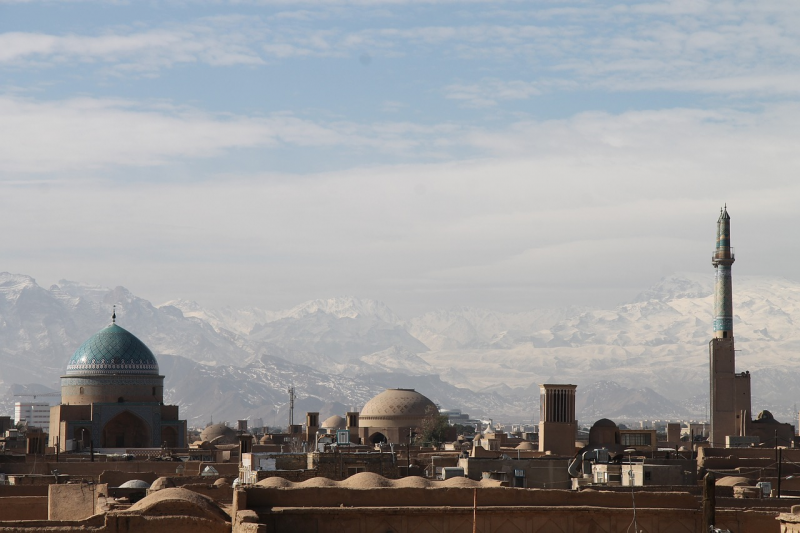Q&A: Does Soleimani Killing Mean War With Iran?

Just a few days into 2020, the United States is facing escalating conflict with Iran after a U.S. airstrike killed Iranian Major-General Qassem Soleimani. Since then, tensions between the countries, and inside the United States, have run high as questions around war, nuclear weapons and national security remain.
The DU Newsroom turned to Nader Hashemi, director of the University of Denver’s Center for Middle East Studies and associate professor in the Josef Korbel School of International Studies, for his insight and perspective.
Is the rhetoric of the current administration likely to weaken or strengthen the Iranian regime?
The Trump administration is continuing with a long American tradition of supporting the forces of authoritarianism in Iran and the broader Middle East, albeit indirectly. This might seem perplexing to some, but consider the following context.
For the past few months, the focus on politics in the region — especially in Iraq, Lebanon and Iran — has been protesters demanding their rights. This development deeply challenged the Islamic Republic internally. The regime was forced to kill about 500 people to suppress the protests, while regionally, pro-Iranian governments in Lebanon and Iraq were facing popular movements for reform and accountability.
After the killing of Qassem Soleimani, the focus of politics has shifted to the theme of American aggression. This is a gift to Iranian hardliners who, like conservatives everywhere, want to focus public attention on external national security threats rather than questions of good governance and human rights.
Moreover, while the theme of democracy has strong roots in Iranian political culture that go back over 100 years, the themes of anti-imperialism and nationalism are also very strong. Iran’s clerical leaders are using these themes to rally the masses around a new narrative that seeks to challenge Trump’s hawkish policy toward Iran. Sadly, it seems to be working, and Trump and his advisors are largely to blame.
Is this likely to push the U.S. closer to war? Is the possibility of a new world war an exaggeration?
It is an exaggeration to speak of a new world war. A broader Middle Eastern war, however, is certainly possible. It depends on how Iran responds to the killing of Soleimani. The chance of a rapid escalation that leads to a wider conflict, dragging in Israel and Saudi Arabia, is a possibility. I do not see Russia or China getting involved at this stage, but I do fear the rise of a new form of radical religious extremism.
Until now, most of radical extremist currents in the Middle East have been Sunni forms of extremism connected to ideological currents that are based in Saudi Arabia (Wahhabi Islam). Recent military action by the United States carries the risk of provoking a Shia Muslim variant of Islamic radicalism that seeks to challenge Western interests globally. We are not there yet, but a military strike on Iran along the lines that President Trump has recently proposed — hitting 52 targets inside Iran, including cultural sites — could unleash a new wave of radical Islamic extremism.
Does anyone stand to gain from a possible war in Iran?
No one stands to gain from a war with Iran. The biggest losers would be the people of Iran. Sadly, some Republican supporters (and admirers of [Israel’s] Benjamin Netanyahu and Saudi Crown Prince Mohammed bin Salman), erroneously believe that a war with Iran might produce a good result if only Trump will take it a step further and attempt to decapitate the Iranian regime. We have seen this movie before, and it is called the 2003 Iraq War. Attempting something similar in Iran would be catastrophic for the Middle East and the wider world.
Given Iran’s recent statements regarding the demise of the Iran nuclear agreement, what concerns should we have?
Iran’s announcement that it would no longer observe any restrictions on its nuclear program as stipulated in the 2015 Iran nuclear agreement is a very worrying development. On the plus side, the Iranian statement did say that it would continue to work with U.N. inspectors, and they will not be expelled from the country. Moreover, Iran’s announcement did not say that it would seek to enrich uranium to the level of 20% (weapons grade) or seek to purse a nuclear bomb. It did leave the door open for this possibility based its national security needs.
Iran also left the door open to returning to the nuclear agreement if it gets sanctions relief from the international community. In this sense, there is some cautious room for optimism. I feared a more radical statement involving the ejection of U.N. inspectors and the formal withdrawal from the Iran nuclear agreement and possibly the Nuclear Non-Proliferation Treaty. The time for robust diplomacy is now.
Join Nader Hashemi and retired ambassador Gary Grappo at noon on Tuesday, Jan. 7 in Margery Reed Hall's Reiman Theater for their event “The Killing of Qassem Soleimani: What’s Next for the Middle East.”



